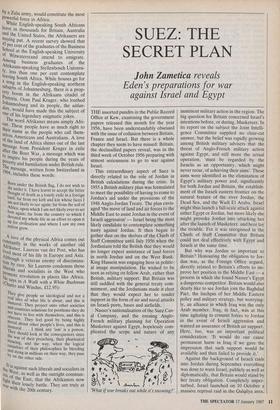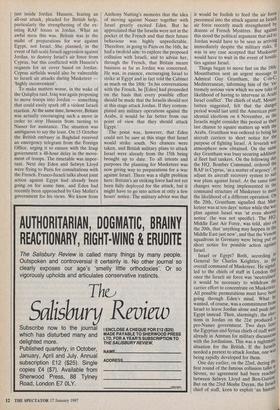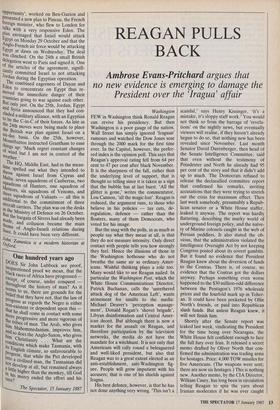SUEZ: THE SECRET PLAN
John Zametica reveals
Eden's preparations for war against Israel and Egypt
THE assorted pundits in the Public Record Office at Kew, examining the government papers released this month for the year 1956, have been understandably obsessed with the issue of collusion between Britain, France and Israel. But there is a whole chapter they seem to have missed: Britain, the declassified papers reveal, was in the third week of October 1956 preparing with utmost seriousness to go to war against Israel.
This extraordinary aspect of Suez is directly related to the role of Jordan in British calculations during the crisis. In 1955 a British military plan was formulated to meet the possibility of having to come to Jordan's aid under the provisions of the 1948 Anglo-Jordan Treaty. The plan envis- aged 'the move of land and air forces to the Middle East to assist Jordan in the event of Israeli aggression' — Israel being the most likely candidate to contemplate something nasty against Jordan. It then began to gather dust on the shelves of the Chiefs of Staff Committee until July 1956 when the Jordanians told the British that they would no longer expect assistance of land forces in north Jordan and on the West Bank. King Hussein was engaging here in politic- al image manipulation. He wished to be seen as relying on fellow Arab, rather than British, military support. But Britain was still saddled with the general treaty com- mitment, and the Jordanians made it clear that they would expect her to render support in the form of air and naval attacks on Israeli ports, bases and airfields.
Nasser's nationalisation of the Suez Can- al Company, and the ensuing Anglo- French military planning for Operation Musketeer against Egypt, hopelessly com- plicated the scope and nature of any
'What if war breaks out while it's snowing?'
imminent military action in the region. The big question for Britain concerned Israel's intentions before, or during, Musketeer. In its report on the subject the Joint Intelli- gence Committee supplied no clear-cut answer, but the belief was rapidly growing among British military advisers that the threat of Anglo-French military action against Egypt, and still more the actual operation, 'must be regarded by the Israelis as an opportunity, which might never recur, of achieving their aims'. These aims were identified as the elimination of Egypt's military power and, significantly for both Jordan and Britain, the establish- ment of the Israeli eastern frontier on the natural feature of the river Jordan, the Dead Sea, and the Wadi El Araba. Israel might thus launch a full-scale attack against either Egypt or Jordan, but more likely she might provoke Jordan into attacking her after the launch of Musketeer. and here lay the trouble. For it was recognised in the Chiefs of Staff Committee that Britain could not deal effectively with Egypt and Israeli at the same time.
But why was Jordan so important to Britain? Honouring the obligation to Jor- dan was, as the Foreign Office argued, directly related to Britain's efforts to im- prove her position in the Middle East — a process in which she found Nasser's Egypt a dangerous competitor. Britain would also dearly like to see Jordan join the Baghdad Pact, the linchpin of her Middle Eastern policy and military strategy, but worrying- ly, an alliance in which Iraq was the only Arab member. Iraq, in fact, was at this time agitating to commit forces to Jordan in the event of Israeli aggression and wanted an assurance of British air support. Here, too, was an important political consideration: 'It would do our cause permanent harm in Iraq if we gave the impression that such support would be available and then failed to provide it.'
Against the background of Israeli raids into Jordan during September everything was done to warn Israel, publicly as well as diplomatically, that Britain would stand by her treaty obligation. Completely unper- turbed, Israel launched on 10 October a massive reprisal raid in the Qalqilya area, just inside Jordan. Hussein, fearing an all-out attack, pleaded for British help, particularly the strengthening of the ex- isting RAF forces in Jordan. What an awful mess this was. Britain was in the midst of preparations for war against Egypt, not Israel. She planned, in the event of full-scale Israeli aggression against Jordan, to destroy Israel's air force from Cyprus, but this conflicted with Hussein's requests for air cover based on Jordan. Cyprus airfields would also be vulnerable to Israeli air attacks during Musketeer 'highly inconvenient'.
To make matters worse, in the wake of the Qalqilya raid, Iraq was again proposing to move troops into Jordan — something that could easily spark off a violent Israeli reaction. At the same time, however, Britain was actually encouraging such a move in order to stop Hussein from turning to Nasser for assistance. The situation was ambiguous to say the least. On 15 October the British embassy in Baghdad received an emergency telegram from the Foreign Office, urging it to ensure with the Iraqi government a 48-hour delay in the move- ment of troops. The timetable was impor- tant. Next day Eden and Selwyn Lloyd were flying to Paris for consultations with the French. Franco-Israeli talks about joint action against Egypt had already been going on for some time, and Eden had recently been approached by Guy Mollet's government for his views. We know from Anthony Nutting's memoirs that the idea of moving against Nasser together with Israel greatly excited Eden. But he appreciated that the Israelis were not in the pocket of the French and that their future behaviour was highly unpredictable. Therefore, in going to Paris on the 16th, he had a twofold aim: to explore the proposed collusion with Israeli, and to advise her, through the French, that Britain meant business as far as Jordan was concerned. He was, in essence, encouraging Israel to strike at Egypt and in fact told the Cabinet as much on the 18th: 'In his conversations with the French, he [Eden] had proceeded on the basis that every possible effort should be made that the Israelis should not at this stage attack Jordan. If they contem- plated any military operations against the Arabs, it would be far better from our point of view that they should attack Egypt.'
The point was, however, that Eden could not be sure at this stage that Israel would strike south. No chances were taken, and British military plans to attack Israel were already from the 15th being brought up to date. To all intents and purposes the planning for Musketeer was now giving way to preparations for a war against Israel. There was a slight problem here: Britain's air striking force had not yet been fully deployed for the attack, but it might have to go into action at only a few hours' notice. The military advice was that
it would be foolish to feed the air force piecemeal into the attack against an Israeli air force recently much strengthened by dozens of French Mysteres. But against this stood the political argument that aid to Jordan would have to be seen as arriving immediately despite the military risks. It was in any case accepted that Muskeeter would have to wait in the event of hostili- ties against Israel. Things began to move fast on the 18th. Mountbatten sent an urgent message to Admiral Guy Grantham, the C-in-C, Mediterranean, informing him of the 'ex' tremely serious view which we now take of likelihood of having to intervene in Arab/ Israel conflict'. The chiefs of staff, Mount- batten suggested, felt that the danger period would last until the American pres- idential elections on 6 November, as the Israelis might consider this period as their last chance to square matters up with the Arabs. Grantham was ordered to bring his aircraft carriers to short notice for the purpose of fighting Israel. A feverish war atmosphere now obtained. On the same day Grantham was busy securing addition' al fleet fuel tankers. On the following day the HQ, Bomber Command, ordered the RAF in Cyprus, 'as a matter of urgency', to adjust its aircraft recovery system to suit war plans against Israel. At the same time changes were being implemented in the command structure of Musketeer to meet the likelihood of a different operation. 011 ttie 20th, Grantham signalled that Mns" keteer was at ten days' notice while the war plan against Israel was 'at even shorter notice' (he was not specific). The HO' Middle East Air Force, was told, also on the 20th, that 'anything may happen in the Middle East just now', and that the Venom squadrons in Germany were being put on short notice for possible action against Israel.
Israel or Egypt? Both, according 10 General Sir Charles Keightley, in the overall command of Musketeer. He signal: led to the chiefs of staff in London that once the Israeli air force was 'neutralised it would be necessary to withdraw the carrier effort to concentrate on Musketeer' All possible permutations must have been going through Eden's mind. What he wanted, of course, was a commitment from Israel to leave Jordan alone and push into Egypt instead. Then, alarmingly, the elec- tions in Jordan on the 21st produced a pro-Nasser government. Two days late the Egyptian and Syrian chiefs of staff were already in Amman for military discussions with the Jordanians. This was a nightmare situation for the British. If the Israelis needed a pretext to attack Jordan, one was being rapidly developed for them. One day earlier, on the 22nd, during tile, first round of the famous collusion talks a; Sevres, no agreement had been reached between Selwyn Lloyd and Ben-Gurion: But on the 23rd Moshe Dayan, the Israeli chief of staff, keen to exploit 'an historic oPportunity', worked on Ben-Gurion and presented a new plan to Pineau, the French foreign minister, who flew to London for talks with a very responsive Eden. The Plan envisaged that Israel would attack Egypt on Monday 29 October and that the Anglo-French air force would be attacking EgYjit at dawn on Wednesday. The deal was clinched. On the 24th a small British delegation went to Paris and signed it. One of the articles of the agreement, signifi- cantly committed Israel to not attacking Jordan during the Egyptian operation. The combined eagerness of Dayan and Eden to concentrate on Egypt thus re- moved the immediate danger of their countries going to war against each other. But only just. On the 25th, Jordan, Egypt and Syria announced that they had con- cluded a military alliance, with an Egyptian to be the C-in-C of their forces. As late as the 24th moves were being made to place the British war plan against Israel on a su'daY basis. On the 25th, however, Mountbatten instructed Grantham to ease thin, gs up: 'Much regret constant changes of wind but I am not in control of the weather.' The HQ, Middle East, had in the mean- tinte spelled out what they intended to throw against Israel from Cyprus and seven squadrons of Canberras, two squadrons of Hunters, one squadron of Meteors, six squadrons of Venoms, and three squadrons of Valiants — all this is additional to the commitment of three ti.eraft carriers. The plan was on the desks 1.1.1 the Ministry of Defence on 26 October. But the bargain of Sevres had already been made, and collusion became the main theme erne of An lo-Israeli relations during tlez. It could have been very different. John Zametica is a modern historian at












































 Previous page
Previous page